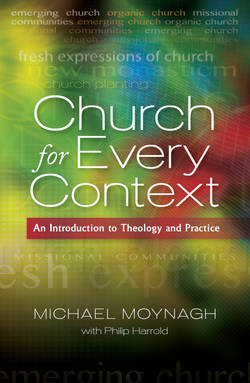Читать книгу Church for Every Context - Michael Moynagh - Страница 98
На сайте Литреса книга снята с продажи.
Connecting with an immanent world
ОглавлениеRelating to a pragmatic, immanent world is a challenge for churches with their transcendent frames of reference. It is possible that the willingness of well-being spiritualities to downplay the supernatural and prioritize life’s concerns has allowed them to corner the market. Maybe, as Heelas suggests, Christianity with its transcendent emphasis cannot compete (Heelas, 2008, p. 21).
Alternatively, if the church became more immanent, more immersed in daily life, without losing the transcendent, might it offer rather more than its rivals? It is striking that the young people interviewed by Collins-Mayo, Mayo and Nash were interested in how Christianity might provide guidelines for living. They valued ethics more than religion (2010, p. 88). In addition, many people still connect with ‘thin spaces’, including birth, marriage and death, where earth and heaven brush closely by each other. Here may be significant points of contact between the church and contemporary people.
The Christian tradition contains abundant resources that, used creatively and within the framework of divine grace, can add value to individuals’ immanent lives. Stewardship connects with issues ranging from money management to ecological threats. Imaginative practices around the Sabbath theme could assist with work/life balance. Practising confession and forgiveness can help to restore broken relationships.
It is in the context of genuinely practical theology that the supernatural may win a hearing. This will become a possibility if the church, through the Spirit, addresses more strongly everyday concerns. The transcendent may add a richness to life which, in the absence of God, can seem devoid of higher purpose. Grace can lighten the burden of self-fulfilment, where so much depends on what the individual does. Christian disciplines and practices can help with day-to-day challenges, from parenting to conflicts at work.
The appeal of Christian practices is likely to be increased if they are embodied in ecclesial communities. A more sociable world will be open to relational expressions of spirituality that offer one-to-one and/or collective support for life-enhancing disciplines. Church can be another ‘personal community’. In addition, people still enjoy festive events, be they pilgrimages, mass assemblies like World Youth Days or rock concerts and raves. These sorts of events fuse common action and feeling. They take participants out of themselves and create a sense of being in touch with something greater. They may indicate a latent demand for worship that connects the individual to the transcendent (Taylor, 2007, pp. 516–8).
Having awakened a desire to explore, Christian communities will want to support individuals in their spiritual quests by steering between two extremes. On one side are expressions of Christianity that put authority first. By being over-eager to convey the truth, these communities may treat the individual’s quest with insufficient respect and push the person to search in a different setting. On the other side are individuals who relish being open to possibilities. They are reluctant to commit, least of all to a transcendent authority.
The Taizé community in France offers an example of a middle way. Its ability to attract thousands of young people a year partly lies in how it welcomes them as seekers. They can express themselves without conforming to a predetermined pattern of belief. Yet the centre of the community has clear Christian roots, which are explored through Bible study and liturgy. There is no obligation, but those who want to examine the Christian faith can do so without preconditions (Taylor, 2007, p. 517).
All this amounts to a strong argument for church-in-life – not church confined mainly to the domestic segment of existence, nor believers isolated in their walks of life, but Christian communities in all settings of society, providing practical support for people’s immanent lives, connecting with individuals’ desire to live good lives, perhaps awakening a hunger for the transcendent and providing a friendly environment for those wishing to tread a spiritual path.
The ethical turn
This represents a turn away from duty and obligation to the moral value of individuals expressing their authentic selves.
Expressive selves live within an ‘immanent frame’, their everyday concerns have an ethical component and relationships with others increasingly dominate their lives.
New contextual churches may be the Spirit’s means of connecting the transcendent to individuals’ immanent lives.
